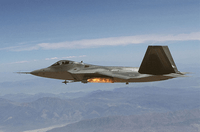In the background of Chinese President Hu Jintao's recent visit to the United States was the specter of increased military tensions between China and the U.S. Chinese military capabilities appear to be growing rapidly, with systems like the J-20 stealth fighter and the DF-21 anti-ship ballistic missile threatening key U.S. assets. However, the summit between Hu and President Barack Obama focused more on economic than military issues. And one of the foremost trade problems discussed during the visit was the issue of intellectual property (IP).
The United States has consistently criticized China for laxness in IP regulation, complaining that Chinese firms and government agencies use unlicensed software, and that U.S. entertainment products are often pirated. Last month, a New York Times editorial similarly decried lax IP enforcement in China.
Disputes about intellectual property don't normally excite the imagination to the same extent as the potential for military conflict, but in fact there is a connection: In addition to being a poor IP citizen with regard to software and movies, China regularly steals military technology from both partners and adversaries.

